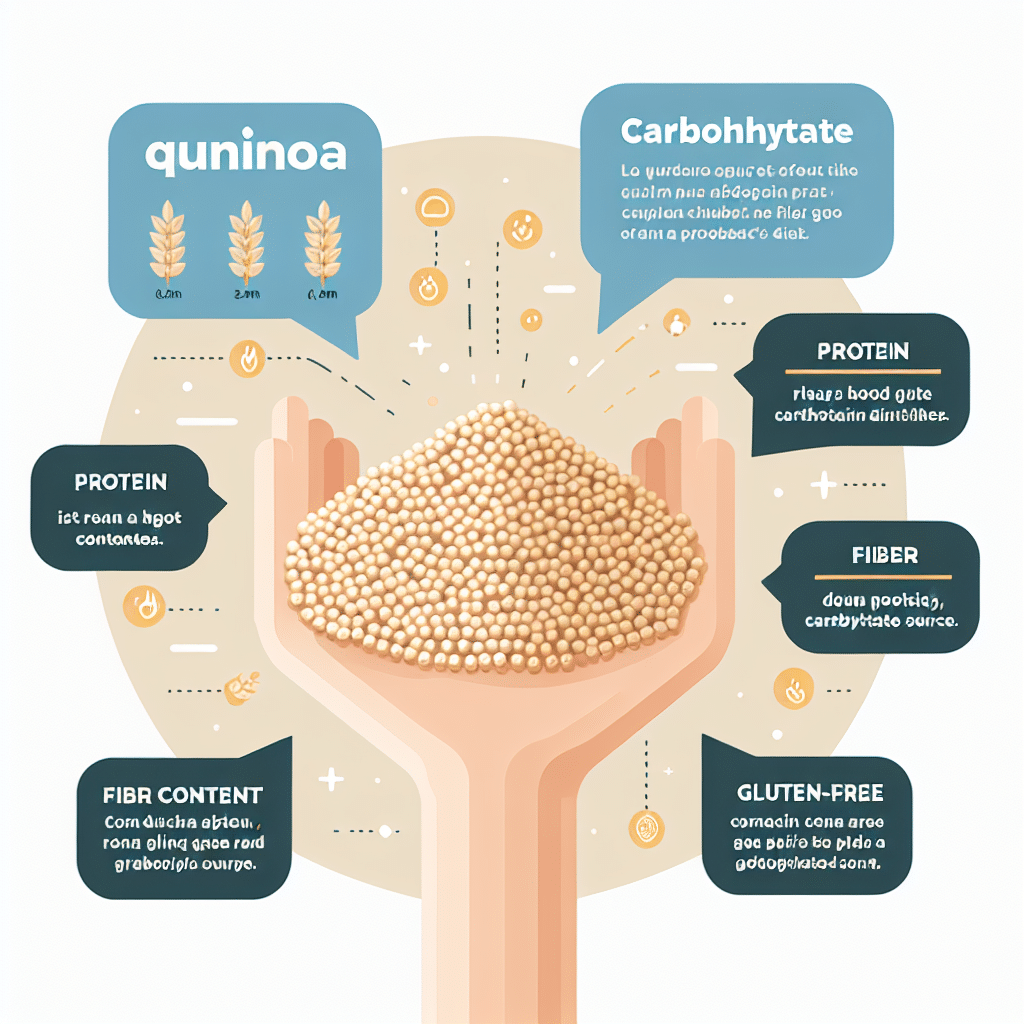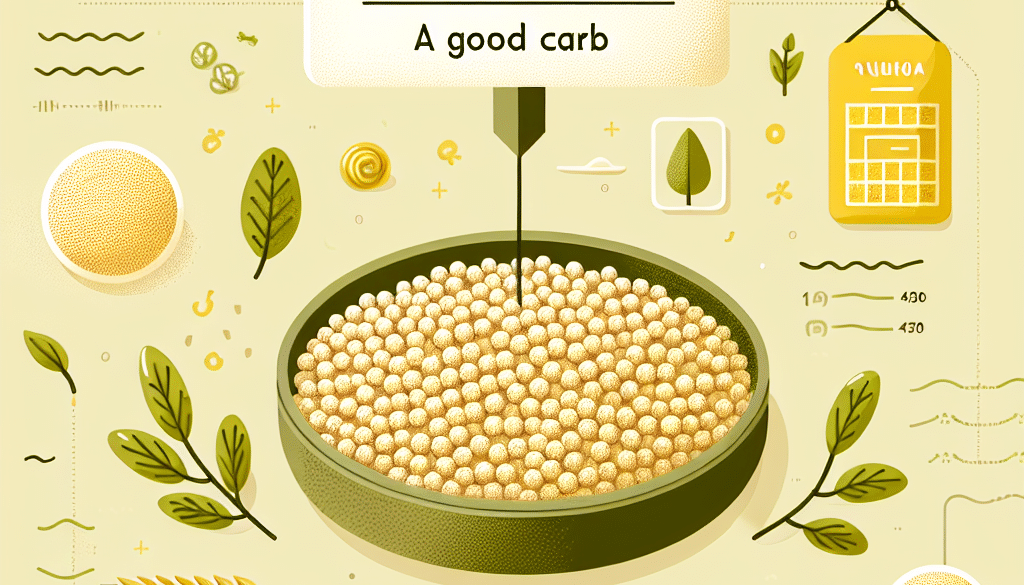Is Quinoa A Good Carb Or Bad Carb?
-
Table of Contents
Quinoa: A Nutritious Carb Choice for Healthy Eating

Quinoa has been hailed as a superfood, and its popularity has soared in recent years. This ancient grain, which is actually a seed, is praised for its nutritional profile and versatility in the kitchen. But when it comes to carbohydrates, there’s often confusion about what constitutes a “good” carb versus a “bad” carb. In this article, we’ll delve into the world of quinoa to determine whether it’s a carb you should be incorporating into your diet or one to approach with caution.
Understanding Carbohydrates: Good vs. Bad
Before we can assess quinoa’s value as a carbohydrate source, it’s important to understand the difference between good and bad carbs. Carbohydrates are a macronutrient that the body uses for energy, and they come in two main forms: simple and complex.
- Simple Carbohydrates: These are quickly digested and can lead to rapid spikes in blood sugar levels. They are found in foods like candy, soda, and white bread.
- Complex Carbohydrates: These take longer to digest, leading to a gradual release of energy. They are present in foods such as whole grains, legumes, and vegetables.
Good carbs generally refer to complex carbohydrates, which are rich in fiber and nutrients. Bad carbs are typically simple carbs that are processed and stripped of their natural nutrients.
Quinoa’s Nutritional Profile
Quinoa is considered a whole grain and is packed with nutrients that contribute to its status as a good carb. Here’s a closer look at what quinoa has to offer:
- High in Protein: Quinoa is one of the few plant foods that contain all nine essential amino acids, making it a complete protein source.
- Rich in Fiber: With nearly twice as much fiber as other grains, quinoa helps in digestion and can aid in weight management.
- Loaded with Vitamins and Minerals: Quinoa is a good source of iron, magnesium, potassium, zinc, and B vitamins.
- Antioxidant Properties: It contains flavonoids like quercetin and kaempferol, which have anti-inflammatory and anti-viral effects.
- Low Glycemic Index: Quinoa has a glycemic index of around 53, which means it has a minimal impact on blood sugar levels.
Quinoa vs. Other Carbohydrate Sources
When compared to other carbohydrate sources, quinoa stands out for its nutritional benefits. Unlike refined grains, quinoa maintains its whole-grain status and doesn’t undergo processing that strips away valuable nutrients. It’s also gluten-free, making it a great option for those with celiac disease or gluten sensitivity.
Studies have shown that quinoa consumption can improve overall diet quality and may contribute to better metabolic health. For example, a study published in the British Journal of Nutrition found that quinoa has a positive effect on energy metabolism and may help in managing type 2 diabetes and hypertension.
How to Incorporate Quinoa into Your Diet
Quinoa is incredibly versatile and can be used in a variety of dishes. Here are some ideas for adding quinoa to your meals:
- Use it as a base for salads or bowls.
- Replace rice with quinoa in stir-fries or as a side dish.
- Add it to soups or stews for extra texture and nutrients.
- Use quinoa flour for gluten-free baking.
- Start your day with a quinoa breakfast porridge.
Conclusion: Quinoa as a Healthy Carb Choice
In conclusion, quinoa is a good carb that offers a wealth of nutritional benefits. Its high protein content, fiber, vitamins, minerals, and antioxidants make it a superior choice compared to many other grains. Quinoa’s low glycemic index also means it’s suitable for those looking to manage blood sugar levels. Whether you’re a health enthusiast or simply looking to improve your diet, quinoa is a versatile and healthy carbohydrate that can enhance your meals.
Enhance Your Diet with ETprotein’s Protein Products
If you’re looking to complement your healthy diet with high-quality protein products, consider ETprotein’s offerings. Their range of organic bulk vegan proteins, including rice protein, pea protein, and various seed proteins, are non-GMO, allergen-free, and boast a neutral taste. ETprotein also supplies L-(+)-Ergothioneine (EGT) in various grades, suitable for a range of industries. Enhance your nutrition with ETprotein’s products for a well-rounded approach to health and wellness.
About ETprotein:
ETprotein, a reputable protein and L-(+)-Ergothioneine (EGT) Chinese factory manufacturer and supplier, is renowned for producing, stocking, exporting, and delivering the highest quality organic bulk vegan proteins and L-(+)-Ergothioneine. They include Organic rice protein, clear rice protein, pea protein, clear pea protein, watermelon seed protein, pumpkin seed protein, sunflower seed protein, mung bean protein, peanut protein, and L-(+)-Ergothioneine EGT Pharmaceutical grade, L-(+)-Ergothioneine EGT food grade, L-(+)-Ergothioneine EGT cosmetic grade, L-(+)-Ergothioneine EGT reference grade and L-(+)-Ergothioneine EGT standard. Their offerings, characterized by a neutral taste, non-GMO, allergen-free attributes, with L-(+)-Ergothioneine purity over 98%, 99%, cater to a diverse range of industries. They serve nutraceutical, pharmaceutical, cosmeceutical, veterinary, as well as food and beverage finished product distributors, traders, and manufacturers across Europe, USA, Canada, Australia, Thailand, Japan, Korea, Brazil, and Chile, among others.
ETprotein specialization includes exporting and delivering tailor-made protein powder and finished nutritional supplements. Their extensive product range covers sectors like Food and Beverage, Sports Nutrition, Weight Management, Dietary Supplements, Health and Wellness Products, and Infant Formula, ensuring comprehensive solutions to meet all your protein needs.
As a trusted company by leading global food and beverage brands and Fortune 500 companies, ETprotein reinforces China’s reputation in the global arena. For more information or to sample their products, please contact them and email sales(at)ETprotein.com today.












